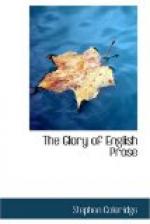“And when at length the moment for the last and decisive movement had arrived, and the valour which had so long been wisely cheeked was at length let loose, tell me if Ireland with less heroic valour than the natives of your own glorious isle, precipitated herself upon the foe?
“The blood of England, of Scotland, and of Ireland, flowed in the same stream, on the same field. When the still morning dawned, their dead lay cold and stark together; in the same deep earth their bodies were deposited; the green corn of spring is now breaking from their commingled dust; the dew falls from Heaven upon their union in the grave.
“Partners in every peril—in the glory shall we not be permitted to participate, and shall we be told as a requital that we are aliens, and estranged from the noble country for whose salvation our life-blood was poured out?”
A hundred years of strife, misunderstanding, anger, estrangement, outrages, bloodshed, and murder separate us from this appealing cry wrung from the beating heart of this inspired Irishman. Is the great tragedy of England and Ireland that has sullied their annals for seven hundred years never to be brought to an end? Is there never to be for us a Lethe through which we may pass to the farther shore of forgetfulness and forgiveness of the past and reconciliation in the future?
That you may live to see it, Antony, is my hope and prayer.
Your loving old
G.P.
23
MY DEAR ANTONY,
I gave you in a former letter Burke’s famous passage on the fate of Marie Antoinette—in some ways the most splendid of his utterances,—and I now am going to quote to you a very great passage from Thomas Carlyle on the same tragic subject.
Courageous was it of Carlyle, who must certainly have been familiar with Burke’s noble ejaculation, to challenge it with emulation; but in the result we must admit that he amply justifies his temerity.
The tragic figure of the queen drawn to execution through the roaring mob inspired Carlyle with what is surely his most overwhelming product.




